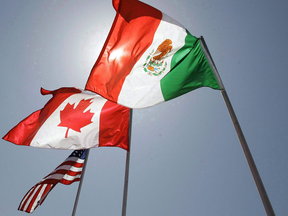Article content
Canadian renters might be seeing some light at the end of the tunnel, as the average increase in the national rental rate rose at its slowest pace in almost three years, according to a new report by Urbanation and Rentals.ca Network Inc.
The asking rent for all property types across Canada rose 3.3 per cent to $2,187 in August from the same period a year ago, the report said, maintaining the trend of slowing increases in previous months. Year-over-year asking rents increased 5.9 per cent in July and seven per cent in June. Rents reached a record high of $2,202 in May 2024 and have since come down by 0.7 per cent.
Article content
The slowdown in rent increases was attributed to a rise in apartment completions in 2024, which have reached “their highest total in decades,” moderating population growth and a weakening labour market.
“Rent increases in Canada finally returned to their longer-term average after nearly three years of excessive growth,” Shaun Hildebrand, president of Urbanation, said in a press release.
Prior to the pandemic, the average asking rent for all property types in August 2019 was $1,818, and that fell to $1,718 in August 2020.
The data for August 2024 is a big comedown from August 2022, when rents rose 12 per cent from the year before.
Decelerating increases in rents is welcome news for people looking for a home as well as the Bank of Canada, which in its most recent interest rate decision cited shelter costs as one of the factors that could be blocking inflation from slowing further.
“High shelter price inflation is still the biggest contributor to total inflation but is starting to slow,” the central bank said in its official statement announcing that it had cut interest rates for a third consecutive time, taking the benchmark lending rate to 4.25 per cent.
Article content
The Bank of Canada started this cutting cycle at five per cent.
The Urbanation/Rentals.ca report said average asking rents for purpose-built and condominium apartments rose 4.7 per cent in August from last year to $2,142, but the purpose-built segment accounted for most of the increase.
“Studio and three-bedroom units led purpose-built rent growth, increasing by 10.7 per cent and 11.8 per cent annually, respectively,” the report said, while studio condo rents fell 3.3 per cent, falling on an annual basis for the sixth consecutive month.
British Columbia and Ontario posted the highest rents, but they also posted declines above the national average, with annual average rents falling by 5.2 per cent and 4.3 per cent, respectively.
“The province with the least expensive rents was also the fastest growing, with Saskatchewan apartment rents rising 21.4 per cent from a year ago to an average of $1,338,” the report said.
Recommended from Editorial
-
Reduction of B.C. short-term rentals won’t fix housing prices
-

Toronto rents hit three-year low — but brace for a comeback
At the municipal level, Toronto and Vancouver had the highest rents for August, though they were down seven per cent and six per cent, respectively, from a year ago.
The largest increases in average rents were recorded in Quebec City, Regina and Saskatoon. They rose 22 per cent in Quebec’s capital and 18 per cent in both Prairie cities.
Email: gmvsuhanic@postmedia.com
Bookmark our website and support our journalism: Don’t miss the business news you need to know — add financialpost.com to your bookmarks and sign up for our newsletters here.
Share this article in your social network
Rent increase rises at slowest pace three years
2024-09-10 18:42:14






